A Speech Heard Around the World: How Nan Goldin's Retrospective ...
A large crowd had gathered on both sides of the tall glass walls of Berlin’s Neue Nationalgalerie as Nan Goldin stepped onto a small stage inside. It was Friday night, the evening of her German retrospective’s opening, but no one expected her to speak about the exhibition. There were police around the museum, though they remained outside. Plain-clothes security, guards, and mediators lingered near the stage.
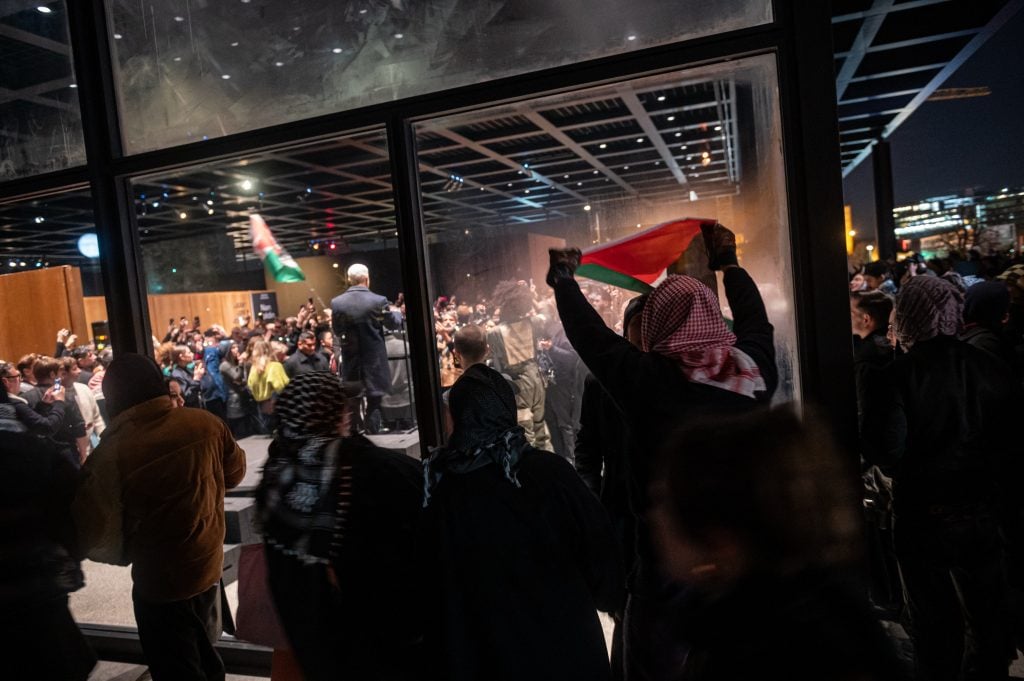
For some, the artist’s exhibition opening became a referendum on the German cultural landscape. Earlier this week, Goldin had distanced herself from a symposium called “Art and Activism in Times of Polarization” that was planned around her exhibition, from which a string of planned speakers withdrew their participation, sparking controversy over the event. Speaking to press in the tense days leading up to her show, Goldin made clear she would deliver a speech on the Middle East on the occasion of her opening. As a vocal artist-activist who has made her pro-Palestinian stance known previously, online activists who sided with her promoted the importance of attending in solidarity with Goldin.
The artist began with a phone-free moment of silence that lasted four minutes to commemorate the dead in Palestine, Israel, and Lebanon.
“Were you uncomfortable? I hope so,” she said as the moment came to a close. Phones were back on Goldin as she then went on to deliver a forceful speech in which she condemned the Israel-Gaza war and decried what she called Germany’s complicity abroad and censorship at home.
Pro-Palestinian demonstrators stand at the opening of the exhibition “Nan Goldin. This Will Not End Well” during a speech by Klaus Biesenbach, director of the Neue Nationalgalerie. Photo: Fabian Sommer/dpa via Getty Images.
“I decided to use this exhibition as a platform to amplify my position of moral outrage at the genocide in Gaza and Lebanon,” Goldin said. “I saw my show as a test case. If an artist in my position is allowed to express their political stance without being canceled, I hope I am paving a path that others can speak out without being censored.”
Goldin had the floor for 14 minutes and her comments were rapidly disseminated around the art world via social media. It was posted to Instagram by David Velasco, the former editor of Artforum (Goldin was a signatory of a contested letter demanding a ceasefire in Gaza that led to his firing), and by the artist-activist Adam Broomberg. Ai Weiwei and Wolfgang Tillmans posted images of Goldin delivering her speech.
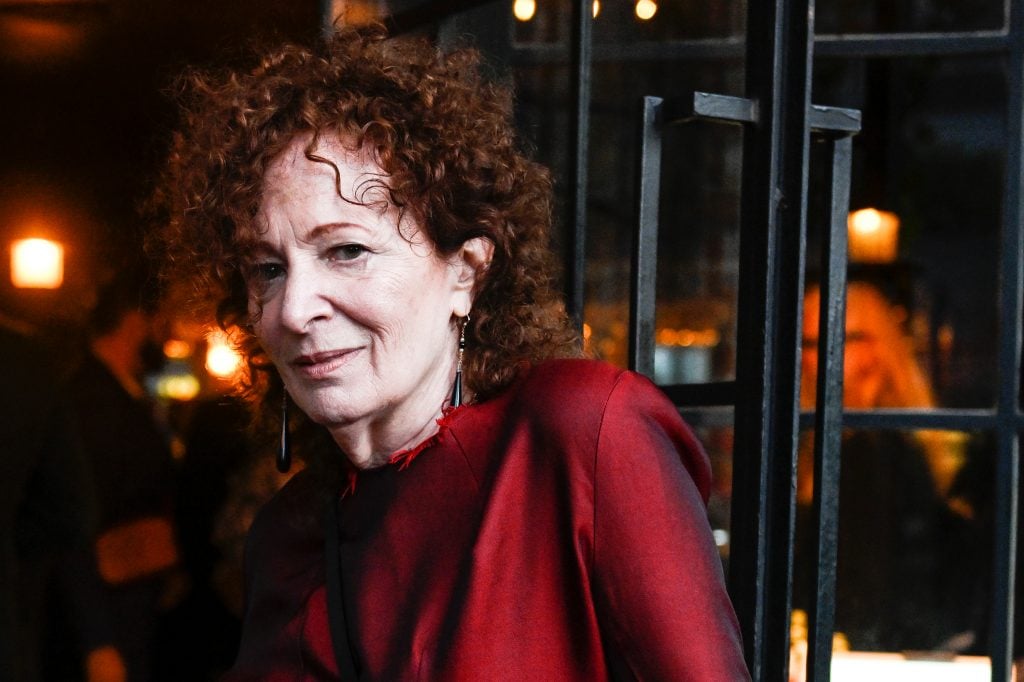
Tensions have been simmering in Germany, beyond Goldin’s exhibition. At the beginning of November, a resolution was passed with the stated goal to “ensure that no organizations or projects that spread antisemitism, question Israel’s right to exist, call for a boycott of Israel or actively support the Boycott, Divestment, Sanctions (BDS) movement receive financial support.” Amnesty International was among those who voiced concerns about the resolution, saying “there is a risk of disproportionate interference with freedom of expression, art, science, and assembly.”
Nan Goldin. Photo: Daniel Zuchnik/Getty Images for Housing Works
The week of Goldin’s opening, architect James Bridle had a prize rescinded for signing an open letter pledging to boycott Israeli institutions. In its message, the German institution cited the recently enacted resolution in its reasoning. City-wide funding cuts of 12 percent that will be enacted in 2025, totaling €120 million ($127 million), have put additional stress on what has long-been seen as a flourishing cultural hub.
Goldin, who is among the most acclaimed photographers in the world, called attention to a circulating list that names 180 people and institutions, including artists, who have allegedly been disinvited or silenced in Germany in some way due to their political stance.
“Advocating for human rights cannot be antisemitic,” Goldin continued in her speech, during which a few members of the audience shouted “Fuck Israel,” “Fuck Germany,” and “Yalla Intifada,” the latter of which has been typified by the Amadeu Antonio Foundation as antisemitic.
“In declaring all criticism against Israel as antisemitic,” Goldin said, “it makes it harder to define and stop violent hatred against Jews. Meanwhile, Islamophobia is being ignored.”
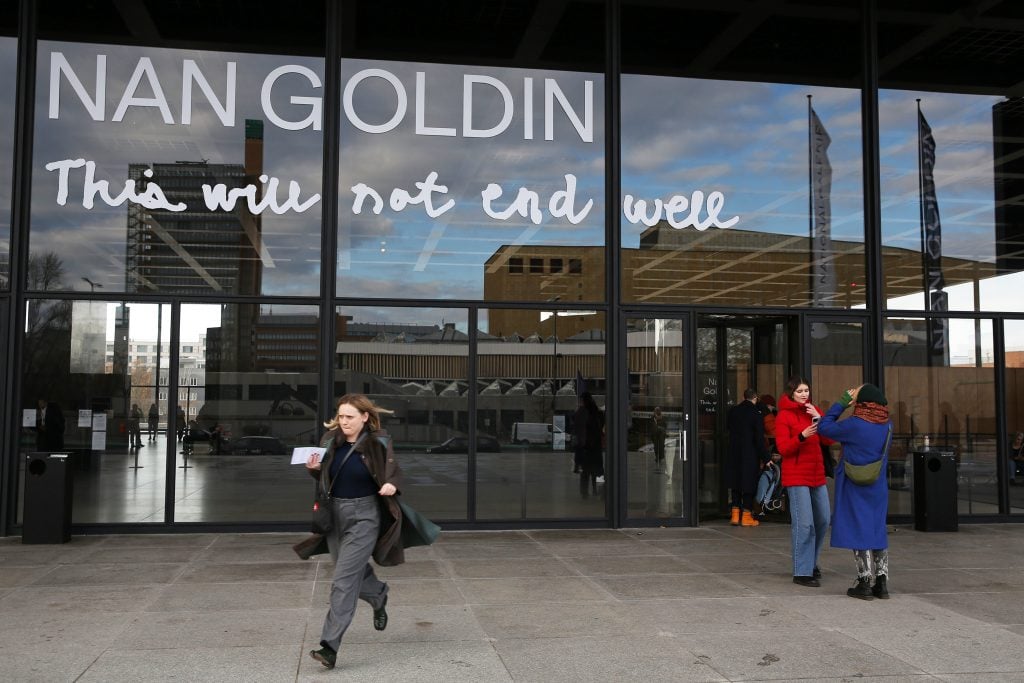
She referenced the recent arrest warrant issued by the International Criminal Court for Israel’s Prime Minister, Benjamin Netanyahu, and former minister of defense, Yoav Gallant. “Are you listening, Germany?” she asked.
Visitors attend the exhibition “This Will Not End Well” by photographer Nan Goldin at Neue Nationalgalerie, on November 23, 2024 in Berlin. Photo: Adam Berry/Getty Images.
Though there was a mass of support for Goldin at the event, German cultural officials were quick to distance themselves from her statements. Hermann Parzinger, head of the Prussian Cultural Foundation, which oversees the state museums of Berlin, including the Neue Nationalgalerie, was listening from the audience. Later, he took to the social media platform X to voice his concerns, calling Goldin’s comments “unbearable and dangerously trivializing due to their one-sidedness,” adding they were “deeply at odds with the basic attitude of all of us at the foundation.”
Joe Chialo, Berlin’s culture minister from the center-right CDU party, called Goldin’s “statements hardly acceptable,” stating that “in our city of Berlin, where the Holocaust was planned and which now stands for freedom, such one-sidedness that forgets history is unacceptable.”
Goldin, who grew up in a Jewish household, said what she sees in Gaza reminds her of the pogroms that her grandparents escaped in Russia. “’Never again’ means never again for anyone,” the artist stressed. As Goldin left the stage, she was met with applause and pro-Palestine chants, which drowned out director Klaus Biesenbach’s attempts to deliver a speech responding to Goldin. Protestors unfurled Palestinian flags, images of German riot police, and a large banner stating “Staatsraison = genocide.” (Staatraison, meaning “reason of state,” has been used by politicians to stress Germany’s commitment to Israel’s safety.) The group marched outside where the protest continued.

Neue Nationalgalerie director Klaus Biesenbach delivered his speech after a mass of protestors cleared out of the museum. Photo: Artnet
Culture Minister Claudia Roth, who was also in attendance, expressed opposition to Biesenbach’s inability to express his view. “I am appalled at the way the director of the New National Gallery was shouted down,” said the Green politician. “Such behavior is absolutely unacceptable and it is an attack on the museum and cultural work, which I condemn in the strongest possible terms.”
Biesenbach later took to the stage, giving an abridged version of his speech.
He stressed that he disagreed with Goldin. “We consider it our responsibility and role to offer a space for debate on issues that are often left unspoken. Our work is grounded in essential values that are non-negotiable,” said Biesenbach. “Israel’s right to exist is beyond question for us,” he continued, condemning the attack on October 7, 2023, as cruel and unjustifiable. “We insist on the release of the remaining hostages. When Jews are threatened or persecuted simply because they are Jewish, we show our solidarity.”
“At the same time,” Biesenbach continued, “we sympathize with civilians in the Gaza Strip and Lebanon, whose suffering cannot be overlooked. All people in the Middle East have the right to live without fear […] We advocate for a peaceful solution to the Middle East conflict now. As a museum, we are deeply committed to the freedom of art and the freedom of expression, even in cases when we disagree.”
Online, these statements from Biesenbach and other officials were met with anger by some who felt it inappropriate to frame Goldin’s speech as an opinion to disagree with. Newspaper Frankfurter Allgemeine Zeitung typified the event as “chaos” and a “scandal.”
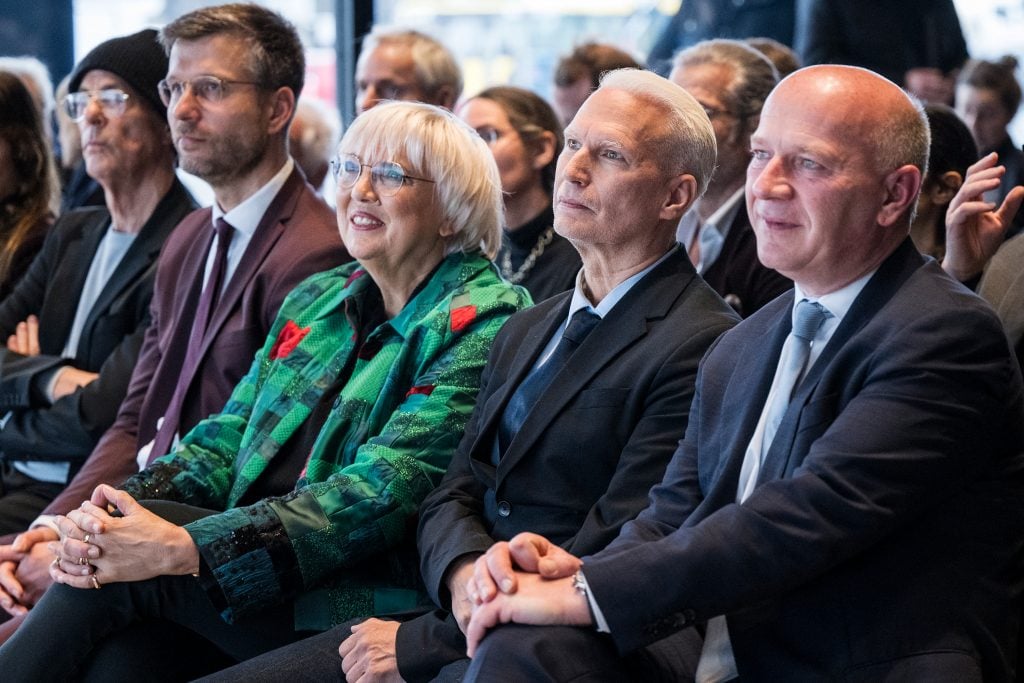
From left: Federal Government’s Commissioner for Culture and the Media Claudia Roth, Director of the Neue Nationalgalerie museum Klaus Biesenbach and Mayor of Berlin Kai Wegner in Berlin, on February 9, 2024. Photo by Stefanie Loos/AFP via Getty Images
Later in the evening, the mood loosened and the focus shifted back to Goldin’s exhibition; music radiated throughout the museum from the several pavilion structures built to showcase her slideshows that span her decades-long career.
Meron Mendel and Saba-Nur Cheema, the Jewish-Muslim couple who were behind the “Art and Activism in Times of Polarization” symposium, held on Sunday after the retrospective’s opening, were among those in the crowd.
“I am sure there will be people who criticize this evening. I am not one of them,” said Mendel. He emphasized that the Sunday symposium sought to reflect on the question of why the conflict Middle East is such a flashpoint in the art world. “[Goldin] is an activist, and it is coherent with her practice that she would deliver a speech. It is her right to do it. She is getting the stage to speak as long as she wants. The main allegation of Nan was the cancellation of Palestinian voices. I think this evening and Sunday proves exactly the opposite is happening.”
Mendel noted that Goldin was invited to do a keynote and end-note speech at the symposium. The photographer confirmed last week that she had been invited to the symposium, but distanced herself from it after she read the press release. After this, several speakers, including Candice Breitz, Eyal Weizman, and Hito Steyerl, withdrew from the symposium. Cheema and Mendel had the stated hope of bringing together a diverse range of speakers, from Jewish, Muslim, Israeli, Palestinian, and German backgrounds. But the lead-up to the symposium became fraught once Goldin distanced herself from it, via a reply to Strike Germany’s call for a boycott of the event, which they described as being “largely occupied by genocide-denying Zionists” in an Instagram post.
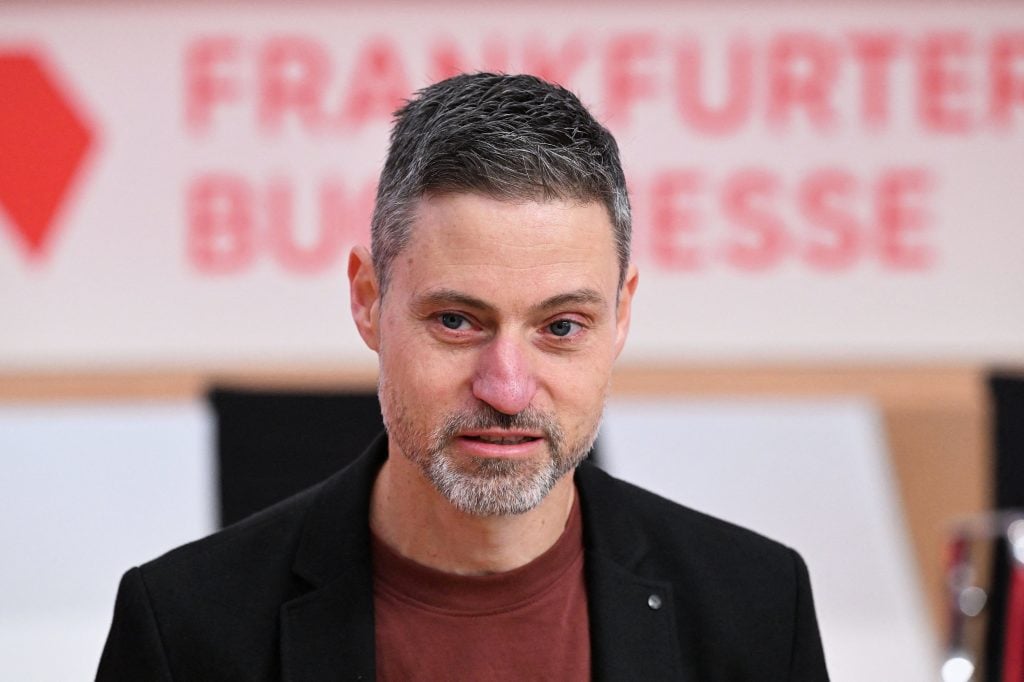
Meron Mendel, director of the Anne Frank Educational Centre, on October 18, 2023 in Frankfurt, Germany. Photo by Kirill Kudryavtsev/AFP via Getty
“We invited pro-Palestinian and Palestinian activists to say whatever they want to say,” Mendel said. “We also invited people who have a different perspective. That is the issue, those who complain about cancelation are the ones who, when they get the stage, want to talk alone, and do not want other opinions to be heard that is not their opinion. That is a problem […] That is a blind spot of this activism.”
He added that this kind of denial of different opinions comes from both sides. “We also have people on one side who are willing to talk, but they say they will not speak with people who are using the word ‘genocide.’ We have people on the other side who will not speak with people who are ‘genocide-deniers.’ Both sides are using the same tactic,” he said. “Both of them are totalitarian, anti-democratic, and anti-liberal.”
One of the most recent withdrawals from the event came as late as Friday evening. Haifa-based Palestinian Muhammad Toukhy canceled his presence on a panel called “Cultural Boycott: Purpose, Effect, Criticism.” In a statement sent, he said he grew concerned after Goldin’s remarks that the event was organized without her knowledge and that it was “used to shield the institution from criticism of her outspoken anti-Zionist position.” He condemned a lack of transparency around the changing speaker list, which he said he was not informed of, and the presence of those on the panel who “marginalize the Palestinian struggle.”
Installation view of Nan Goldin’s “This Will Not End Well” at the Neue Nationalgalerie, 2024. © Staatliche Museen zu Berlin / David von Becker.
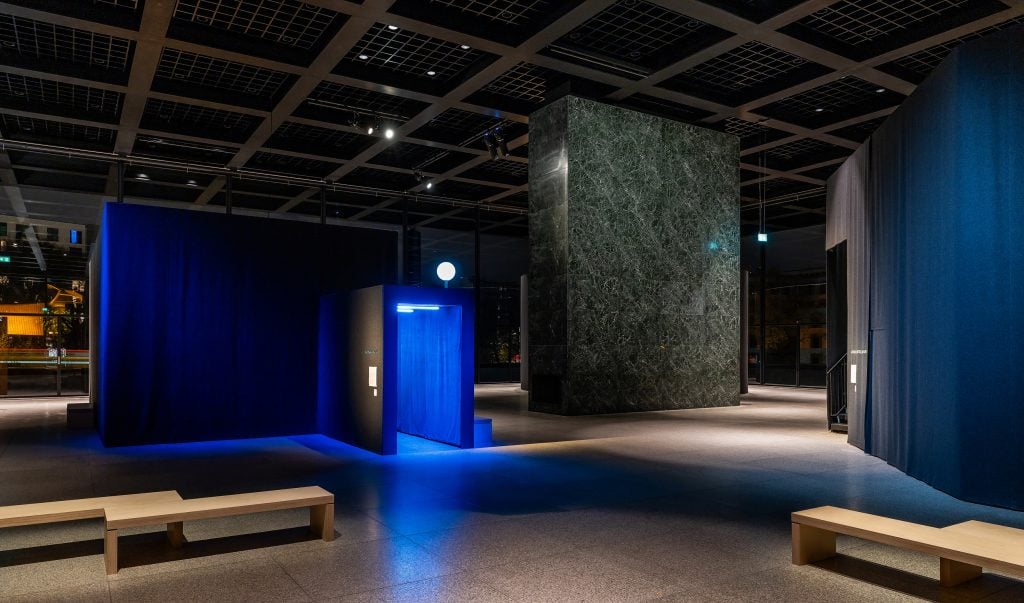
“I envisioned an event that engaged critically with the role institutions play in perpetuating or challenging injustice. Such a symposium should have unapologetically positioned itself as a platform to amplify voices advocating for liberation, resistance, and accountability,” wrote Toukhy.
“I still believe in gatherings that foster meaningful dialogue,” he added. “I regret that this event could not live up to those ideals.”
On Sunday morning, at the State Library across the street from the museum, the talks took place peacefully with a changed speaker list. Bags and coats were not allowed inside, and the attendance list required a full first and last name as part of the registration process. Outside, several who wanted to attend the symposium but had not entered their name or were not on the list were turned away.
Mendel and Cheema delivered a keynote address to substitute Steyerl. They cited disapproval about Germany’s recent resolution to fight antisemitism, the defamation and threats being used on social media against those with differing perspectives, and expressed concern about how, faced with a rising right-wing, “the freedom of art is in real danger.”
And while the debates were thinned out due to the lost perspectives of panelists who canceled, it managed to touch on issues including anti-Muslim sentiment, boycotts, and blind spots in anti-semitism.
“There was distrust around this symposium,” said critic and editor Maria Inés Plaza Iazo, who had stepped in to replace Breitz. “I understand where it is coming from, but without dialogue, there is only violence.”









































